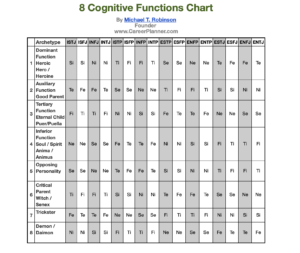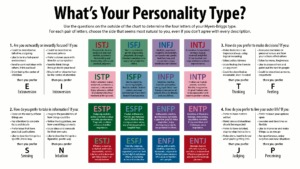Identity. A word that can mean so many distinct things for different people. It can be a compilation of one’s memories, feelings and experiences. It can be your family, your background, or your friends. Identity can be a term to describe anything that makes a person, them. The only issue is, it can be complicated to understand who you are. It is not easy to compile an entire individual’s life experiences, habits and character into a set, and definite category. Yet human nature pushes us to assign names and structure to everything around us.
Well, in the field of psychology, a widely known personality classification system has been developed, known as Myers-Briggs Type Indicator System. The Myers-Briggs Assessment is based on a set of 8 functions theorized by a renowned and distinguished Swiss psychiatrist, known as Carl Jung. He developed the 8 functions as follows:
- Extraverted Thinking (Te)
- Introverted Thinking (Ti)
- Extraverted Feeling (Fe)
- Introverted Feeling (Fi))
- Extraverted Sensation (Se)
- Introverted Sensation (Si)
- Extraverted Intuition (Ne)
- Introverted Intuition (Ni)
If you are already familiar with personality types, you may notice that the categories “judging” and “perceiving” are missing. These groups were only later added to the Myers-Briggs system in particular. Depending on which functions are dominant in descending order, your personality type is described using a 4 letter combination.
Each function is categorized as introverted or extraverted, meaning what happens inside the mind and outside the mind respectively. The four perceiving functions are extraverted sensing, introverted sensing, extraverted intuition and introverted intuition. The “perceiving” functions are characterized as how a person perceives information given to them. The judging functions are extraverted thinking, extraverted feeling, introverted thinking and introverted feeling. The “judging” functions are characterized as how a person makes their decisions. Each function has a specific meaning to it, for example, extraverted thinking is the making of decisions using objective facts whereas introverted thinking is decision-making through logic, data, classifications and personal theories.
What I think sets aside Jung’s personality classification from others is the ambiguity associated with its core systems. Jung recognized that individuals are far too complicated to be defined through one label and instead settled on the philosophy that everyone has a bit of each function. Still, some are stronger and weaker for different people, characterised by the archetypes of dominant, auxiliary, tertiary and so on functions. He even uses that philosophy among introversion and extraversion- as someone who is an introvert is not completely an introvert, they are just more of an introvert in comparison to an extrovert.
Above are the 16 Myers-Briggs personality types composed of 4 letters with their associated Jungian dominant and weak functions listed. The dominant function is the strongest function of that personality type- what trait that type uses the most and strongly. The Auxiliary function is the second most strongly used function, and so on with the other archetypes following this pattern down the chart, with your 8th and last function (the “demon” function) being your weakest function.
While the Myers-Briggs system uses the Jungian function system as its base, its types are characterised by 8 letters, each having its own meaning.
First Letter:
- I – introversion
- E – extraversion
Second Letter:
- S – sensing
- N – intuition
Third Letter:
- T – thinking
- F – feeling
Fourth Letter:
- P – perceiving
- J – judging
So for example, an INTJ is introverted, and uses intuition, thinking and judging. Each of these personality types has personality descriptions and associated traits. with them
In the Myers-Briggs community, it is suggested to find your personality type using your own research into the functions and what best fits your personality, for which I recommend careerplanner.com which has detailed insights on each of the functions and explains the Jungian system in an understandable manner. After all, who knows you best rather than yourself? Nevertheless, if you are looking for a quick outlook on where you fit into this system, you can use the popular 16 personality test. On a side note, I did find that the mistype investigator personality test can give you a more accurate personality assessment in comparison to 16 personalities, as it is considered by experts to be an oversimplified version of the actual 16 personality types. However, it is still a great resource as it sums up each personality in an easily digestible manner for those who have just discovered these concepts!
Whether it be for self-discovery or career planning, finding your personality type can give you a feeling of self-fulfilment and help you understand yourself and the people around you in a clearer light. Even so, you can find fictional characters with the same personalities as you using a personality database! Once you know which personality type you are there is a lot of room for exploration and research, and I hope that you also can find the same enjoyment in learning about yourself in the same way that I do.
Featured Images: 1


